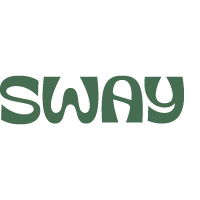Sway Polybags
A groundbreaking alternative to the virgin clear polybag. Made with seaweed, plants, and home compostable polymers. Translucent, durable, and lightweight.

Seaweed Inputs
Made with over 50% TPSea™ - a 100% bio-based resin predominantly made with responsibly sourced seaweed.
Compostable
Designed to decompose in home & industrial compost - TUV Austria certification pending.
Translucent
Made with transparent film allowing for easy barcode scanning and product visibility. 7 to 8% opacity.
Moisture-resistant
Can withstand some moisture, such as humidity and exposure to rain in transit.
Made in USA
With globally sourced seaweed inputs.

Our Partner
In partnership with Sway, a biomaterial innovation company.
Custom Sway Polybags
Create an exceptional customer experience with custom Sway polybags. Add your branding starting at just 500 units. Our Sway polybags can be branded on one side in black Algae Ink™ or Pantone Black.
Use 1,000+ packaging units each week? Work with us on a fully customized Sway Polybag project, including custom sizing and inline printing.
| Material | Made with over 50% TPSea™ - a resin made predominantly with responsible sourced seaweed. The balance of the film is made with compostable polymers. |
| Recycled Content | None |
| Certifications | TUV Austria home and industrial compost certification pending |
| Thickness | 2.75 mil |
| Material Features | Translucent: While not entirely clear, it's transparent enough to easily scan barcodes.
Moisture-Resistant Non-toxic and GMO-free |
| Functionality | Durable, protective, lightweight, and designed to protect goods in transit from production to your customer's doorstep. |
| End-of-Life | Designed to decompose in home and industrial compost, pending certification from TUV Austria. Individuals who do not have access to composting should landfill these bags. |
| Origin | Made in the USA |
| Bag Color | Golden tint |
| Ink Type | Black Algae Ink™ or Pantone Black |
| Print Process | Flexographic |
| Print Option | Post-production: MOQ of 500 units, print on the back side of the bag. |
What is this bag made from?
What is this bag made for?
Can this bag package food?
Why seaweed?
Unlike terrestrial crops farmed through conventional agriculture systems, seaweed thrives off sunlight and seawater, requiring low to no inputs. It’s abundant, fast-growing, space-efficient, and available on nearly every coastline. Seaweed can also generate a lot of good as it grows: increasing habitat for marine life, boosting biodiversity, and mitigating climate change impacts like ocean acidification and erosion. Plus, new science suggests that seaweed can sequester substantial amounts of carbon.
Where does Sway source seaweed from?
How does Sway ensure sustainable seaweed sourcing?
1. Cultivation & Processing Methods: Sway prioritizes seaweed regeneratively grown in polyculture settings to replenish and restore natural habitats, making exceptions for cases like sargassum – an invasive equatorial species that Sway is exploring as an underutilized resource through the Puerto Rico Studio project. Sway works closely with its seaweed suppliers to gather data on ecosystem impacts over time, processing footprint, and much more.
2. Global & Regional Diversity: Sway uses a diverse set of red and brown seaweeds from around the world as the base of its packaging technology. Seaweed is naturally rich in polymers (agar, alginate, and carrageenan), all of which Sway uses and explores in formulation development. With diversity as a top priority, Sway helps support the positive impacts of expanded seaweed cultivation while avoiding over-reliance on any one region or species.
3. Coastal Community Impact: All seaweed used in Sway materials is cultivated by farmers who are provided fair wages and good treatment. Sway champions suppliers whose #1 priority is positive social impact, such as supporting the transition to climate-resilient coastal economies with lobster fishermen in Maine, Indigenous communities in Brazil and Chile, and tourism-reliant communities in the Caribbean. And that’s just the beginning!


